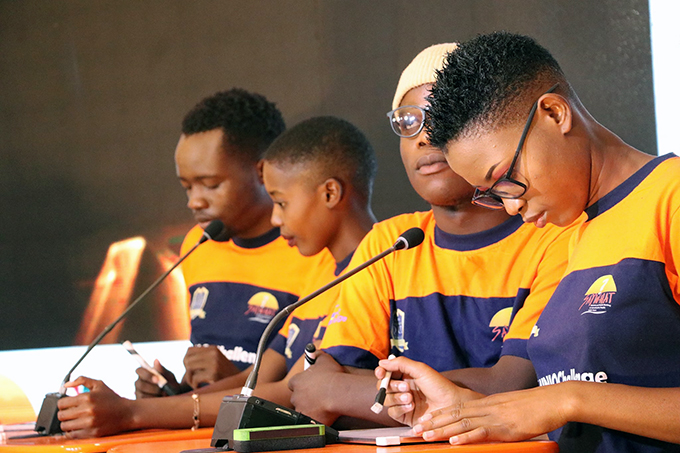
SAYWHAT
New Partner: Greetings from GEAR Alliance
The three countries share historical, political and socio-economic backgrounds. This makes lack of education among the young people in rural communities common.
The limited access to primary and secondary education for girls and young women in rural and farming communities of Malawi, Zambia and Zimbabwe requires a collaborative and strategic advocacy to influence policy changes in the three respective countries. The trio shares glaring inadequacies around domestic funding of education systems, curriculum and infrastructural facilities for education in rural and farming communities.
The new project aim to support in-country CSOs collaborations so that they are able to demand from respective governments accountability on the right to education. The alliance is privy to the international educational frameworks the three countries have committed to. Understanding the dynamic nature of the sexual reproductive health rights discourse informs the redefinition of any organization’s scope and strategies without abandoning the historical foundations.
The consortium is founded on the principle of regional solidarity in the implementation of interventions, projects and programs that complement each other and harness the greater collective of a Southern Africa with empowered young people through access to rights such as education, health, clean environments, employment and recreation.
In essence the consortium sustains its efforts by creating an enabling transnational policy environment for Southern Africa which allows for the engagement and inclusion of young people in the planning, processes, products and services for young people of Southern Africa.
The story of lead applicant SAYWHAT
Zimbabwe Students And Youth Working on reproductive Health Action Team (SAYWHAT) is a membership-based public health social movement organization (PHSMO), founded in 2003 with the express ambition to contribute towards the existence of a generation of healthy young people in Zimbabwe and the SADC Region.
SAYWHAT offers non-clinical health services through the provision of health information to young people so that they make informed health choices. Initially, SAYWHAT’s target was students at higher learning institutions before widening its net to incorporate young people in communities due to evolvement and the keen interests to deliver an inclusive and comprehensive sexuality education.
Over the years, through its strategic sexual and reproductive health programming work, SAYWHAT has observed that to attain a Generation of Healthy Young People, education is key.
The organization has worked with various partners to carry out health and well-being interventions with students and young people in general for purposes of capacitating the same to become responsive to their health and well-being needs.
At the advent of COVID 19 in March 2020, SAYWHAT adopted innovative ways of sustaining its grip on promoting healthy choices among the young people through the construction of a studio to promote virtual programming. This was partly out of the realization that unattended or poorly attended sexual and reproductive health issues, comparatively as a result of COVID 19’s restrictive nature, gave rise to mental health, drug and substance abuse amongst the young people.
So, the establishment of a studio has given the young people a platform to hold to account public office bearers. Through Power Talks and Legal Talk show productions, young people are engaging with parliamentarians, lawyers and government officials asking the critical questions to the authorities and policy makers.
The studio of choice as affectionately known, has made it possible for SAYWHAT to reach out to its stakeholders outside Zimbabwe through virtual productions. This is one of the innovations that has enabled SAYWHAT to stay afloat in as far as engaging with stakeholders is concerned. The Studio of Choice, apart from churning out productions online, is also a school for young people to discover and develop their talents outside classroom environments. The young people and the youths are capacitated regularly so that they are able to make significant contributions towards solving some health and education related challenges.
In addition to the studio, in 2020 SAYWHAT also established a Call Centre where young people from all backgrounds are seeking immediate help on sexual and reproductive health, gender-based violence and mental health. In turn, young people get immediate counselling services and referrals in cases where a clinical solution is required.
The organization also works closely with law enforcement agents to apprehend those who would have violated young people’s sexual and reproductive health rights.
On the regional front, SAYWHAT continues to make inroads through its engagement platform, the Southern African Regional Students and Youths Consortium (SARSYC). The Southern African Regional Students and Youth Consortium (SARSYC) represents a multiple sectorial space for academics, researchers, young activists, state and non-state actors who thrive to secure and deliver young people’s socioeconomic rights in the Southern African Region.
SAYWHAT has hosted three Editions of the Southern African Regional Students And Youth Conference in 2015, 2017 and 2019 in Zimbabwe, South Africa and Zambia respectively. The 4th Edition of the Conference will be held in Malawi in August 2022.
Next steps
SAYWHAT has experienced momentum in improving young people’s access to information and sexual reproductive health services and this new project will build on that and remain committed to the communities and the needs of students and young people.
The consortium will above anything attract attention to legislations that ensure universal access to sexual and reproductive healthcare, including emergency contraception and access to safe abortion services in humanitarian crises.
